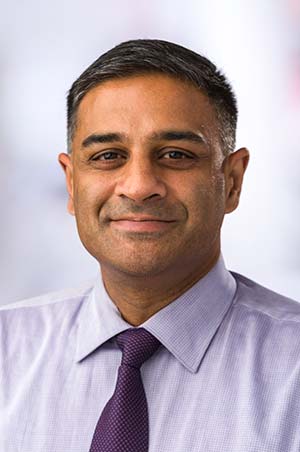Ramesh Rengan, MD, PhD
Senior Vice President and Director
Radiation Oncology Division, Fred Hutch
Dr. Ramesh Rengan studies photon- and proton-based radiation treatment for cancer. His main objective is to improve the therapeutic benefit and minimize the harms of these forms of radiation. He is interested in how radiation therapy can synergize with immune-harnessing cancer treatments called immunotherapies. To this end, he is learning how to use radiation to trigger an anti-cancer immune response to treat patients with advanced lung cancer, melanoma, lymphoma, kidney cancer and other malignancies. He also develops new methods to visualize and measure the effects of radiation therapy on cancerous and healthy tissues. Finally, he studies health care disparities and ways to increase patient access to radiation therapy. Dr. Rengan treats patients with a variety of solid-tumor cancers.
Other Appointments & Affiliations
Professor, Department of Radiation Oncology, University of Washington School of MedicineProfessor, Department of Radiation Oncology
University of Washington School of Medicine
Chair, Department of Radiation Oncology
UW Medicine
Peter Wootton Professorship in Radiation Oncology
UW Medicine
Education
Residency, Radiation Oncology, Memorial Sloan-Kettering Cancer Center, 2006
MD, University of Michigan, 2001
PhD, Biological Chemistry, University of Michigan, 2001
MSc, Biological Chemistry, University of Michigan, 1995
BSc, Chemistry, University of Michigan, 1992
Research Interests
Approaches to improve the therapeutic ratio in solid tumors to ionizing photon or proton radiation
Pre-clinical and clinical strategies to utilize radiation to trigger an anti-tumor immune response in patients with advanced malignancies
Healthcare disparities and expanded access to radiation treatment in low-resource environments
Photon- and Proton based radiation regimens to trigger an immune response to augment immunotherapeutic platforms in solid malignancies including NSCLC, melanoma, lymphoma, and renal cell carcinoma
Development of biomarkers of immunologic and tumor response to ionizing radiation in solid tumors
Functional imaging to interrogate tumor and normal tissue response to ionizing radiation in solid tumors
Impact of healthcare resources on radiation-related outcome in solid tumors
